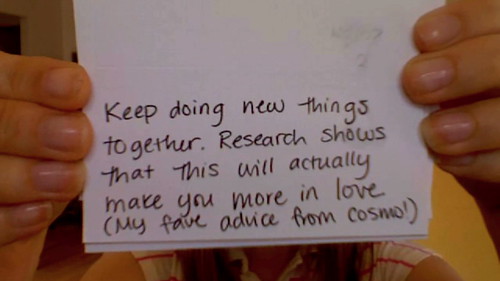When I first hear a marriage tip, I know it’s easier said than done. Usually, the marriage tip is: do this and don’t do that. The following marriage tip from webMD is very true and usable, but what makes it so hard to put into practice?
http://www.webmd.com/sex-relationships/features/7-marriage-tips-stay-lucky-love.

Photo Courtesy of oxmour via Flickr
Marriage Tip No. 2: Replace the 7 deadly habits in a marriage with the 7 caring habits.William Glasser, MD, a Los Angeles psychiatrist, and his wife, Carleen Glasser, MA
The seven deadly habits are criticizing, blaming, complaining, nagging, threatening, punishing, and bribing.
The seven caring habits include supporting, encouraging, listening, accepting, trusting, respecting, and negotiating your differences.
Why is it so hard to treat the one we love with equality and respect?
It’s the unexamined stuff of our inner life that gets in the way. I can’t just snap out of it when someone says, relax, be more trusting and respecting. I usually don’t respond with, “Thanks for the advice I’ve never thought of that before.” Becoming a whole individual in marriage takes self reflection and a little psychological understanding.
Self reflection is the hard part but it is Thee Work. Self reflection allows you to see your part of the Work. This is your emotional responsibility. Self reflection, that is applied to your relationship, has soul-mate potential.
These are some of the questions to meditate on:
- What do I dislike in my partner that I dislike or can’t accept in myself? For example, “I feel self conscious expressing myself, so when you are talking, all I hear is me, me, me.”
- Where am I overly controlling with you and how do I do the same to myself? For example, “I am self-critical, rule bound, and rigid in various areas of my own inner life.”
- How am I acting out pain of my own, on my partner? For example, “What part of this hurt is mine, it came from my past, it has nothing to do with you.”
- How am I treating my partner as my parents treated me, both positive and negative?
- This is one of the hardest to admit, both positive and negative behaviors. When you know what you learned from your parents, you can decide if you want to do it the same way or differently. Some of the stuff we learned from our parents doesn’t always work for us.
- What scares me about intimacy? For example, “If I trust someone emotionally, I will get hurt again and I can’t bare that another time.” For example, “If I really share my inner life with someone, they would know the real me and I can’t take the chance of being rejected.”
The insight that is gained by examining these big questions can minimize the unnecessary suffering in a relationship, and provide the bases for a lifetime of growth. You have to ask yourself, “How long am I going to do the same miserable patterns over and over again, without getting to the bottom of it?”
Marriage Tips: Easier Said than Done: Part two
A little psychological knowledge makes it easier.
Continues on the next post.
